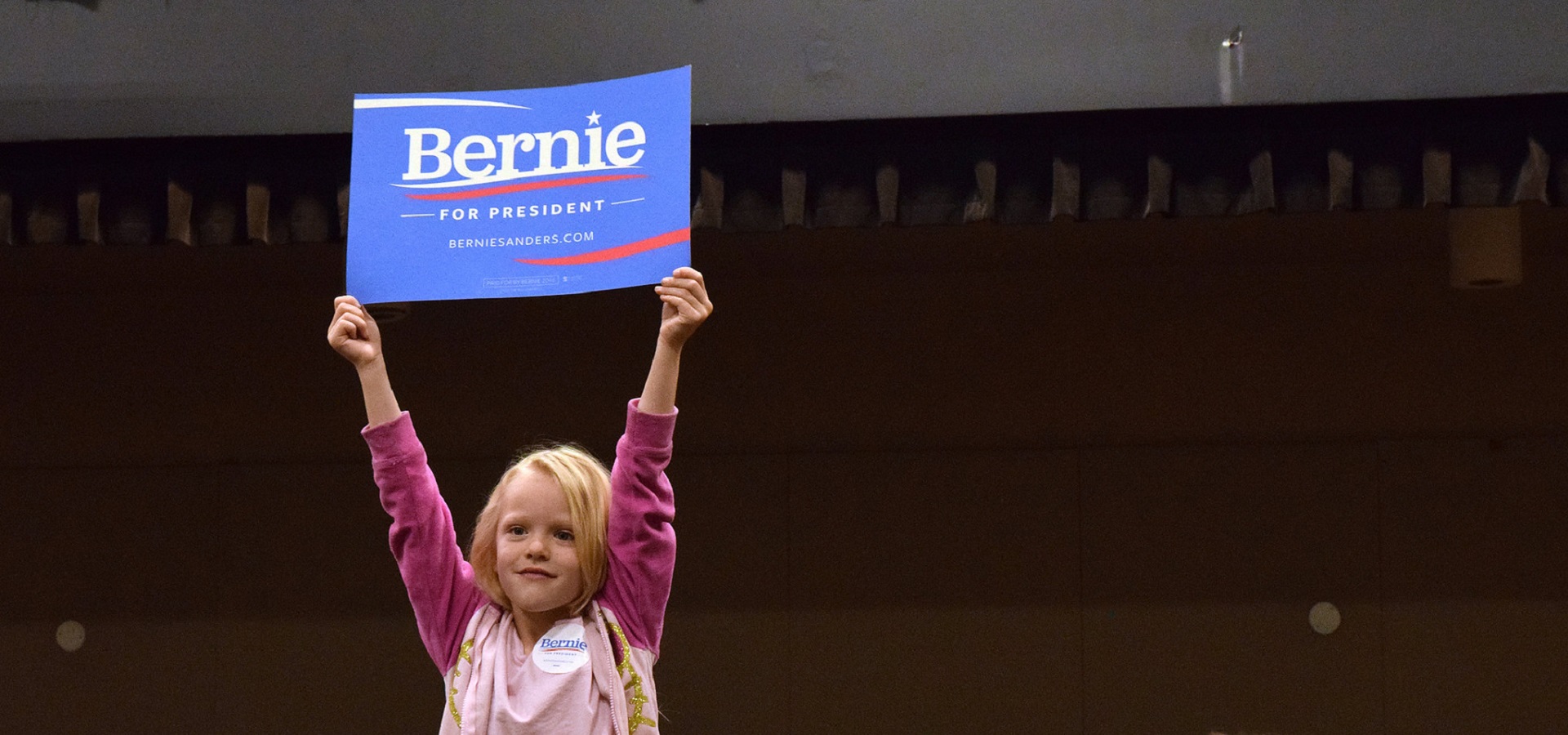As the race to decide this year’s Democratic U.S. Presidential candidate barrels towards the heart of the nation’s long and confusing primary season, it’s becoming a contest between progressive Senators Bernie Sanders and Elizabeth Warren on the left; former New York Mayor, recent Republican, and billionaire businessman, Mike Bloomberg on the right; and the two middle-of-the-road party favorites former Vice President Joe Biden and Minnesota Senator Klobuchar fighting for attention in the narrowing center. But as environmental voters really start feeling Sanders, the party establishment is pushing back. L. Michael Buchsbaum takes us there.

Sanders promises change in environmental policies. (James Brooks, CC BY 2.0)
They all get it, just not equally
Though all the candidates are light-years ahead of Trump on the environment, what separates them are their reactions to the climate emergency. It’s clear who is proposing taking action commensurate to the crisis at hand and who has other priorities. What’s still uncertain, however, is if the tattered Democratic National Committee wouldn’t rather see Trump win than lose control of the party to Sanders’ Democratic Socialist political revolutionaries.
As Bernie’s populist campaign, centered around a very ambitious Green New Deal, starts to steamroll across the country, standing in its way are the Democratic party’s powerful core of neo-liberal centrist donors. One of the most influential of whom is Bloomberg himself. The world’s 8th richest man, worth over $64 billion, he has already spent (as of 25th of February) over $500 million in advertising and social media influence, even though he’s only on the ballot beginning on delegate and voter rich Super Tuesday, March 3 when over a dozen states, including California, Texas, Virginia and Colorado vote.
Bloomberg has showered politicians, NGOs and other influencers with “at least $10 billion” over the last few years, according to the Guardian. After announcing his candidacy last year, his annual political and related contributions ramped up to over $3.3 billion. So smug has Bloomberg’s ownership position become, he momentarily bragged in the most recent debate in South Carolina, the last before delegate rich Super Tuesday, “that his $100 million in spending for Democrats” over the last election cycle had “bought” the party control of Congress. Frustrated with the current crop of candidates and urged on by a circle of elites (reportedly including Amazon’s Jeff Bezos), Bloomberg has decided to take control directly. His main goal? To defend the status quo.
Climate Voters?
Throughout the campaign season, the Washington Post reported, in state after state, climate change has emerged as a key issue for Democratic voters. After feeling its impacts first hand, and seeing renewables boom while fossil fuels tank, voters in wind-energy rich Iowa, appeared way ahead of both the pundits and the political classes.
In New Hampshire, where moose populations are shrinking and winters are warming rapidly, a quarter of Democratic voters listed it as the issue that mattered most, more than income inequality or foreign policy. The same in Nevada where another Edison entrance poll showed 25 percent of voters calling climate change their number one issue. This is in line with a new survey from the Pew Research Center showing that a majority of Americans say combating climate change should be a key focus for the president. Nearly two-thirds of Americans also call environmental protection a top policy priority.
Though much of the corporate media, including the LA Times, play up the candidates’ similarities, the Time’s did allow that their main differences lie “in how far, how fast and how much to spend.” But using other metrics, Greenpeace and the Center for Biological Diversity Action Fund released their guides in February showing a much wider gap between them.
Basing their final grades on policy and voting histories regarding wildlife, public land protection, environmental justice, climate-change, kick-starting the Green New Deal and rejecting fossil fuels, by far the highest overall marks went to Bernie. Greenpeace graded him an A+ (Check out the whole Scorecard here) while the Fund rated him an A. Warren was just behind in both guides.
By contrast, industry friendly candidate Biden received a B and Bloomberg a C+. Of all major candidates, Sen. Amy Klobuchar, who’s biggest donors include Delta Airlines and Agri-giant Cargill, scored worst, receiving a D from the Fund.
Without question, only Sanders’ and Warren’s climate focus approach the levels of ambition that scientists have long been calling for. But Bernie goes further than any other candidate in terms of detail, scope or affect. Promising to declare a climate emergency from day one, Sanders will address the climate crisis with a gargantuan $16.3 trillion spending package through 2035. It calls for the U.S. to transition to 100 percent renewable energy for electricity and transportation, and reducing emissions by 71 percent, over that time. Under his plan, 100% de-carbonization of the world’s largest economy and largest cumulative producer of greenhouse gasses, will be set for 2050.
Sanders will achieve this while heavily investing in green technology, phasing out fracking and coal nationwide, and creating a restoration and renewables based-economy that could generate over 20 million jobs.
He also calls for cutting military spending, hiking taxes on polluters, and eliminating their subsidies. Sanders also plans massive investments in high-speed rail and resiliency programs like fighting wildfires and drought mitigation. Sanders promises “climate change will be factored into virtually every area of policy, from immigration to trade to foreign policy and beyond.”
Following popular vote victories in the first three primary contests: Iowa, New Hampshire and Nevada, Sanders now leads in both delegates and the popular vote. If Bernie prevails in California and pulls ahead in Texas and other Super Tuesday contests while surviving the onslaught of negative corporate media (Comcast-owned MSNBC and Amazon’s Jeff Bezos owned-Washington Post) as well as much of the Democratic establishment, he’ll have a nearly unbeatable advantage going into the next phase of the race through July’s Cleveland convention.